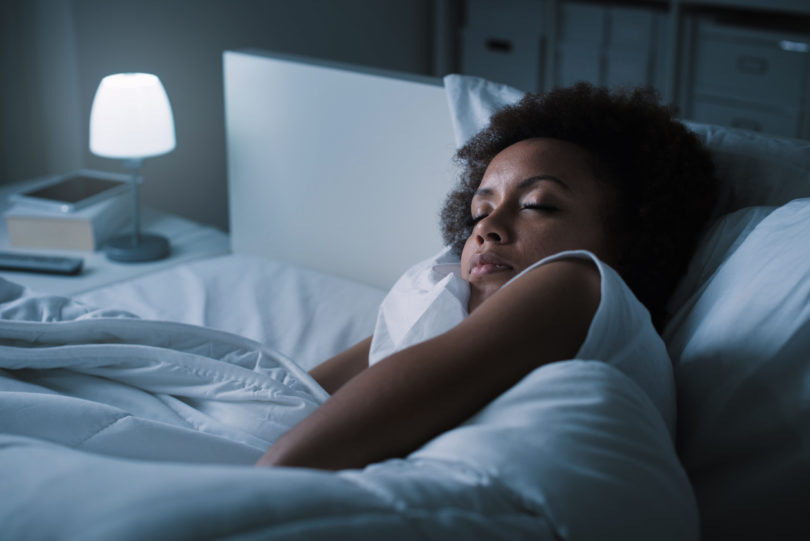You know what gets criminally slept on in the world of self-improvement? Sleep. While it might not appear as impressive as swinging kettle bells or doing hill sprints, it certainly shouldn’t be underestimated. Improving sleep is crucial for optimum health, and in many ways, it has just as much of an impact as exercise and a smart diet.
Poor sleep has been linked to obesity, heart disease, strokes, hormone disruption, decreased brain function, decreased motor performance, DNA damage and even cancer. Therefore, prioritizing sleep is a very worthwhile investment. Here’s an evidence-based list of 10 nifty hacks to improve your shuteye.
Avoid caffeine after lunch
While we might be aware of caffeine’s ability to wake us up, we may be underestimating just how effective it is. The sensations of caffeine might seem to vanish after 30 minutes or so, but in reality, even after several hours, we can experience 50 percent of the effects. One study showed that even if you left 6 hours between your last coffee and bedtime, it can seriously impact your sleep. Better to keep caffeine as a lunchtime treat, or go decaf. Also, try refraining from caffeine as soon as you wake up as you can quickly develop a dependency on it —sorry coffee and tea lovers!
Increase daylight exposure
Daytime light helps inform your body’s biological clock. Therefore, not only will it help you be happier and full of energy during the day, it can also improve the quality and duration of sleep at night. One study showed that an increase in daylight exposure can add as much as two hours of sleep. If you can’t access daylight at work, try to adding slightly bluish, bright lighting to your office or workstation. And even if you bring your own lunch to work, try to find time to at least walk around the block a couple of times.
Don’t eat late
Besides the fact that a belly full of food might make it harder to get comfortable, late-night eating has been shown to impact the quality of sleep. While eating late is not a deal breaker, you may as well try and give at least an hour to digest your last meal before hopping into bed.
Optimize your sleeping environment
There are a few things you can try with this step. An obvious place to start would be your mattress, bedding and pillows. Upgrading these items can improve sleep quality, as can optimizing airflow and temperature in your room. A slightly more advanced but incredibly beneficial upgrade would be to reduce light and noise as much as you can. One of the easiest ways to achieve this to wear an eye mask and earbuds.
An often-overlooked aspect in this area is how you use your bedroom. A bed should really be used for two things: sex and sleep. Try to stick to those as opposed to bringing in other elements, such as watching television or replying to work emails, which can negatively impact the primary bed functions.
Reduce naps
As tempting as a nap can be at times, proceed with caution. Just as not getting enough daylight can mess with your biological clock, so too can napping. While the lure of the nap is strong, remember that you can end up even more tired. However, if you are in desperate need of a power nap, the optimum cut off point should be about 30 minutes — any longer will negatively impact sleep.
Stick to a routine
There’s nothing like a solid sleep routine to keep our body’s biological clock in check. While many of us may have our alarm clocks set for the same time every weekday morning, we may let things slide on the weekends. We also might have a pretty flexible go-to-bed time for all seven days of the week. However, there is solid evidence to suggest that a regular sleeping pattern will significantly improve our sleep. Once we start to stray from the routine, our bodies will start producing melatonin at the wrong times, meaning that we can feel tired during the day, and awake at night.
A great help for sticking to your wake-up time is to position your alarm clock on the other side of the room. Once you’re up and walking, that infamous snooze button will be far less tempting.
Don’t drink before bed
We already mentioned the risks of drinking coffee later in the day, but the drinking of any kind of liquid right before bed should also be avoided. While for some people, this might not be an issue, for many it can cause discomfort, raise energy levels and perhaps most annoyingly, it might trigger a late-night visit to the bathroom. If this sounds familiar, you might want to roll out a no drink policy, 1-2 hours before bed.
Reduce blue light before bed
Just as bright, blueish light can help to keep us awake, dim, warmer light can make us feel tired. Therefore, it is best to avoid digital screens an hour or so before bed. To add to this, you can dim your bedroom lighting and wear glasses that filter out blue light.
Stay active during the day
Exercise should be on most optimization lists, and one regarding sleep is no different. Not only does daytime exercise help to wake you up, it also improves all aspects of sleep, such as getting to sleep quicker, having a better quality of sleep and sleeping for longer. The only thing to be wary of is intense workouts right before bed.
Relax at night
Relaxing before bed works wonders for sleep. You’ll want to try avoiding anything that could lead to unwanted stress, so it’s best not to get into a heavy conversation or read the headlines. Perhaps put on some relaxing music and do some light stretching. Reading is a nice way to unwind, although you might want to stay away from certain pieces of non-fiction. Taking a hot bath or shower can also be very effective, as can meditation and breathing exercises. For a calming breathing exercise, you can try the following: Breathe in for five seconds, hold for six and breath out for seven. Repeat that for five or so rounds and you’ll be noticeably more relaxed.
So there you have it. No pills or potions. No expensive gadgets. Just 10, easy-to-implement, evidence-based steps to improve your sleep and therefore improve your health. Sleep tight.







